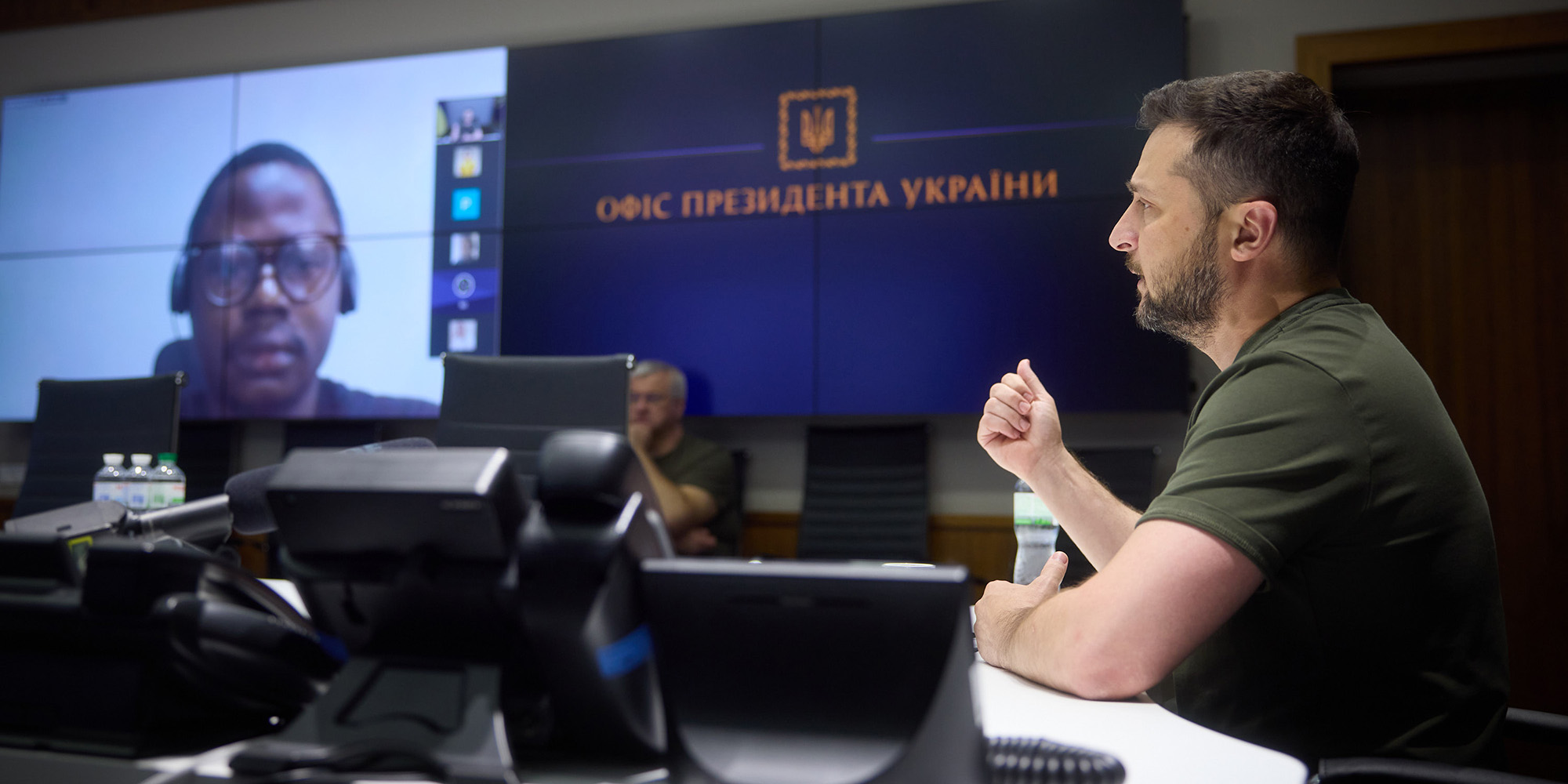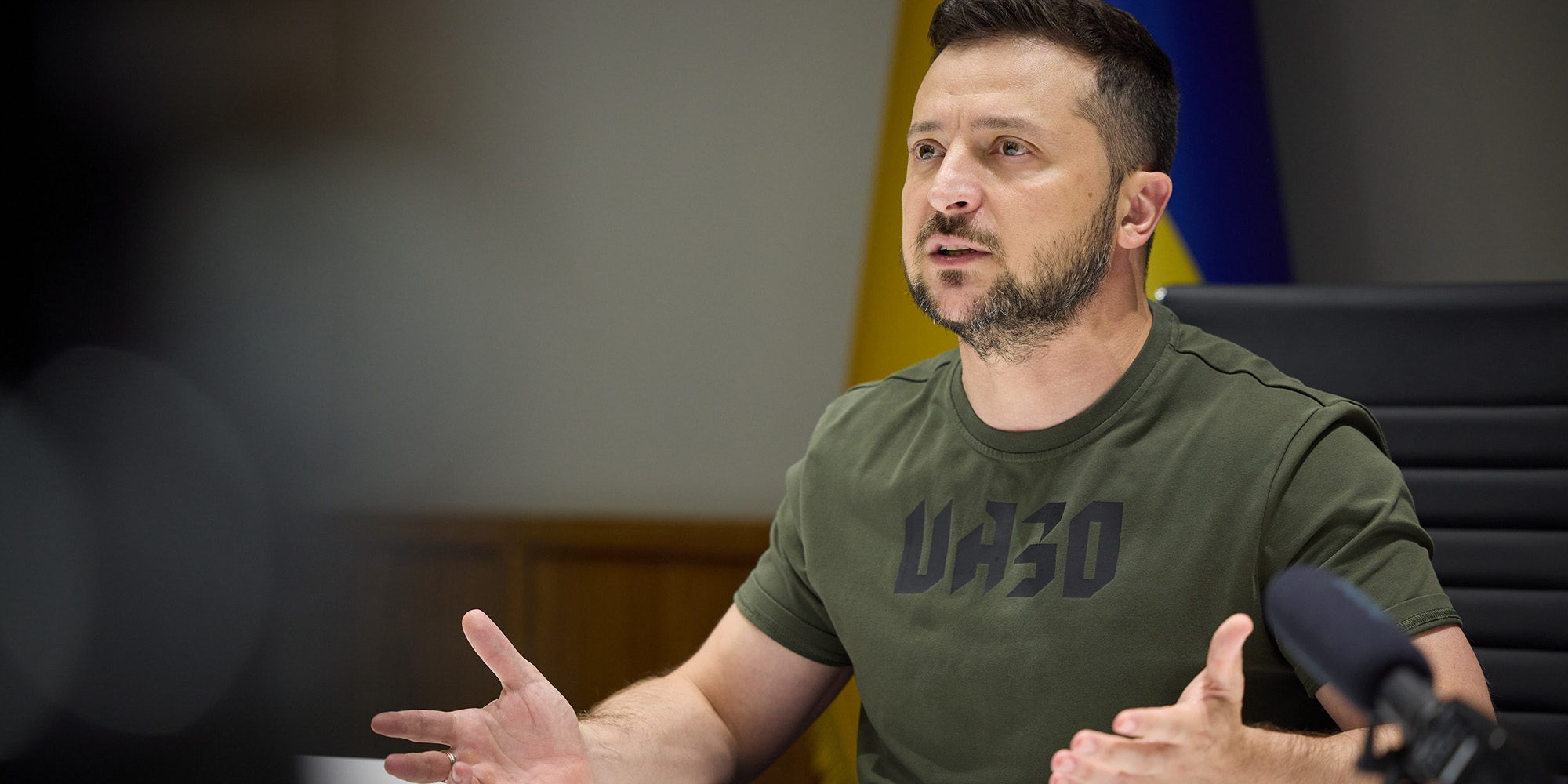“I don’t believe there can be a neutral position to war,” Ukrainian president Volodymyr Zelensky said in his first public comments on South Africa’s stance on the war. He was speaking on Thursday, presumably from Kyiv, in his first online briefing to African journalists.
The briefing seemed to be part of a growing contest between Ukraine and Russia to influence Africa. Last week, Russian foreign minister Sergei Lavrov visited Uganda, the Republic of Congo and Ethiopia, and while in Addis Ababa, he also briefed diplomats from several other African countries, including South Africa.
Zelensky acknowledged that it was most important for Ukraine to win the information war — “the war of truth” — to expose the “lies” Russia was spreading about the war.
 President of Ukraine Volodymyr Zelensky speaks to journalists virtually across the African continent on 4 August 2022. (Photo: Supplied)
President of Ukraine Volodymyr Zelensky speaks to journalists virtually across the African continent on 4 August 2022. (Photo: Supplied)
He was asked for his views on South Africa’s position on the war, which Pretoria itself characterises as “non-aligned”. Zelensky said he could not understand South Africa’s position.
“Maybe my sharp… attitude is because I’m feeling this war… I’m part of this war. Maybe you can’t feel that at a distance, but I believe that neutrality is the wrong attitude.
“There cannot be any neutrality between life and death, between life and famine. In the case of Russia and Ukraine, there can be no neutrality.”
Zelensky suggested that a country like South Africa might lack the money, weapons or political influence to have much of an impact on the outcome of the war.
“But diplomatically, you have to condemn the deaths… you have to condemn the autocracy, the racism, the Nazism and Russism — you have to condemn the aggression.
“You can’t remain neutral,” he said, suggesting that South Africa was diminishing its global standing by doing so.
“Whenever you’re neutral to the war, from a large country you turn into a small country. Nobody can see you. And the world can’t see you.
“So when you have challenges and problems, you have to keep in mind that the whole world could be neutral to those challenges.”
Zelensky said this was not about “give me that and I will give you something in return… like I give you grain and you give me something in return.
“For example, if tomorrow the South African Republic would be lacking wheat from us, should we say that, well, the South African Republic was neutral to us, so let’s remain neutral in terms of our wheat supplies?
“No. In that case, we would be inhuman. Our society are humans and that’s why I believe the neutral position is not something we can carry on.”
Zelensky was also asked whether Ukraine could not emulate South Africa’s successful transition in the 1990s through peaceful negotiations between hitherto warring race groups.
Zelensky insisted that, before the war, he had tried to persuade European and other leaders to help him hold direct talks with Russian president Vladimir Putin to avoid the aggression he saw coming.
But no one supported his pleas. Then, on 24 February, Russia — already occupying Crimea and Donbas — invaded Ukraine and killed and tortured his people.
“What should I do after them doing so? Should I make another phone call to Russia?” he asked.
Visit Daily Maverick's home page for more news, analysis and investigations
Zelensky said Russia was telling the world it was ready for dialogue, but in reality it was offering only ultimatums.
“It’s either you do this, this and this, or we will kill you… What kind of dialogue is that? This is not a dialogue or a conversation, but terrorism.
“And they have to understand that if they behave as terrorists, we have to protect ourselves. And we are protecting ourselves. We are in our own country, on our territory.
“Now, if someone, a criminal, would get into your house, your apartment and kill your child, what would you have to say to this person? Would you be killing that person? Or would you be saying to that person, ‘just stop, please, explain, why have you killed the child?’ No. You will be responding because you have no time because this person is about to kill you and the rest of the relatives and friends.
 President of Ukraine Volodymyr Zelensky holds a virtual press briefing with journalists across the African continent on 4 August 2022. (Photo: Supplied)
President of Ukraine Volodymyr Zelensky holds a virtual press briefing with journalists across the African continent on 4 August 2022. (Photo: Supplied)
“They’re not offering any dialogue. They’re offering us to lay down our weapons, to accept their peace, to forget that we have our own country, that we have our own flag, we have our own history… to erase ourselves.”
Zelensky added that Ukraine needed the whole world to back his country “because if Putin is victorious, it will start World War 3. Only this 70-year-old person [Putin] can stop the bloodshed.”
Zelensky was asked why Africans should care about Ukraine’s suffering when so many conflicts were raging in Africa, which the world was largely ignoring.
His reply suggested that Africa should condemn what Russia was doing to Ukraine because it was similar to the continent’s own historical experience.
“Russia is fighting a colonial war against Ukraine… it’s all about racism, it’s all about Nazism… and there’s a new word called Russism.”
Russism was the belief that there was only one race and that Ukraine, despite having its own language and culture, simply did not exist.
“It’s the same tragedy of a large territory invading other territories, torturing, deporting children and others. So we have much alignment in terms of what took place on the African continent.”
Zelensky, however, agreed that injustices were still taking place in Africa and that these were not receiving the attention they deserved. When Ukraine called for greater security guarantees for itself, it intended that its own situation should be regarded as a “tragic example” of a wider problem, including in Africa, he said.
He added that he had intended to visit Africa before the war started, but now was unable to because of the fighting. However, Ukraine’s foreign minister, Dmytro Kuleba, would visit Africa during the northern autumn. Zelensky said he hoped to visit the continent after the war, adding that he had also appointed a special envoy for Africa.
Zelensky said he wanted Ukraine to be the guarantor for food security, in a reference to the recent deal that Ukraine concluded with Russia — brokered by the UN and Turkey — for Moscow to lift its blockade on Ukraine’s Black Sea ports to allow over 22 million tons of Ukrainian grain to be shipped to world markets. The shortage of grain has caused a global food security crisis which is being felt particularly acutely in Africa.
But he also said Ukraine intended to step up its investments to Africa after the war. He noted that in spite of Russia’s considerable political interest in the continent, it had very little to offer Africa beyond that. Less than 1% of Russia’s investments were into African countries, he said.
He offered to share with Africa Ukraine’s considerable digital power, particularly when it comes to providing public services such as paying taxes and receiving state pensions, on mobile phones.
Zelensky was also asked if he was concerned that Russian ships were using Cape Town harbour as a base to prospect the Southern Ocean for oil and gas, in potential contravention of the 1998 international mining ban.
He did not reply directly, but suggested that the reason Ukraine had wanted Africa to support the global sanctions against Russia was to prevent Moscow from subverting those sanctions — especially by selling oil — which was allowing Russia to continue financing its war effort. DM




 President of Ukraine Volodymyr Zelensky holds a virtual press briefing with journalists across the African continent on 4 August 2022. (Photo: Supplied)
President of Ukraine Volodymyr Zelensky holds a virtual press briefing with journalists across the African continent on 4 August 2022. (Photo: Supplied) 